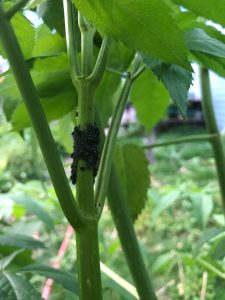How do I get rid of aphids on my Elderberry?
Question:
 I have two elderberries in the back yard, both are three years old. The tall one suddenly got lots of aphids for the first time. Thick clumps of dark purple aphids (with some ants and ladybugs associated). Maybe 1/2 to 3/4 of a cup of aphids total (50-75 stalks involved). I sprayed them off with the hose today, but I am very concerned. The smaller elderberry (a different variety) is just a few inches away (but has no aphids). and there are chokeberries, grapes, raspberries and blackberries all nearby with a small garden of tomatoes and eggplant.
I have two elderberries in the back yard, both are three years old. The tall one suddenly got lots of aphids for the first time. Thick clumps of dark purple aphids (with some ants and ladybugs associated). Maybe 1/2 to 3/4 of a cup of aphids total (50-75 stalks involved). I sprayed them off with the hose today, but I am very concerned. The smaller elderberry (a different variety) is just a few inches away (but has no aphids). and there are chokeberries, grapes, raspberries and blackberries all nearby with a small garden of tomatoes and eggplant.
1) Do some species of elderberry just get this (while some don’t)? How did this one tree get infested? This will help me decide what to do with the elderberry. It’s the first time we’ve ever had aphids in the garden. Do they just float in or get carried in on a bird?
2) If they can be eradicated, that’s one thing. But if they keep coming all summer, and just on the one plant, I’m happy to dig it out. Elderberries are good, but we haven’t had much of a yield anyway.
Answer:
Donna Coffin, Extension Professor
It does look like you have Elder Aphids on your Elderberry plant. You did the correct control by washing off the pests with a strong spray of water. Our factsheet on Sucking Insects That Affect Vegetables includes the following :
Aphids: Often called plant lice, are small, soft-bodied insects. They range in color from black to green to yellow. Their numbers may greatly increase in a short time. They may cover the entire surface of a leaf or stem. They can be vectors of viruses. Encourage natural predators, such as ladybird beetles or lacewing larvae. Lacewing eggs can be purchased from seed companies. These eggs soon hatch and give good aphid control. Aphids can be washed off plants with a garden hose. Insecticidal soap or malathion can be used to control aphids.
To answer your specific questions: Their numbers may greatly increase in a short time and crowding stimulates the production of winged forms. They may cover the entire surface of a leaf or stem. In short, they drifted in and found a new home.
They can not be completely eradicated whether you remove the plant or not. A better choice would be to keep an eye out for more aphids and wash them off with water. If they get to be too much, then you could try some of the suggestions above.
